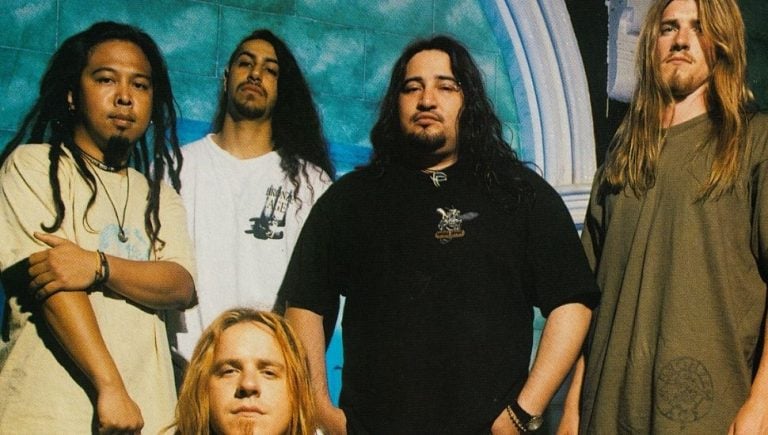In 2020, Fear Factory celebrated the 25th anniversary of their groundbreaking second album, Demanufacture. Fear Factory guitarist Dino Cazares has reflected on the recording process of the record and recalled an incident between the band and Bon Jovi.
Dino Cazares sat down with The Pit, in an extensive interview that saw the guitarist delve into the context of America at the time Demanufacture was being written.
Cazares revealed that the band were profoundly inspired by the Rodney King riots that were unfurling across Los Angeles in 1992. Rodney King, an African-American author and activist was mercilessly beaten by four Los Angeles policeman — three of them white — following a high-speed chase across LA.
The violence the unarmed King suffered at the hand’s of the LAPD was captured by a bystander, George Holliday, from his balcony. The footage was sent to local news station KTLA, which sparked mass reporting and widespread public furor. All four of the policeman involved in the incident were acquitted, and within hours civil unrest began. Residents of Los Angeles protesting the acquital set fires looted and destroyed grocery stores, retail venues and fast-food restaurants.
Cazares detailed how this tumultuous time in American history influenced the band when it came time to pen the record:
“Being in Los Angeles was a big melting pot of all kinds of things happening. From 1992 to 1994, there were a lot of things happening in Los Angeles that pretty much influenced us lyrically, and also the title,” Cazares recalled.
“In 1992, we had the Rodney King riots where L.A. pretty much destroyed itself with fires, people looting, rioting, fighting each other. We’ve seen people protecting their businesses, we have seen people with bullhorns and rifles outside their businesses trying not to get looted.
Love Music?
Get your daily dose of metal, rock, indie, pop, and everything else in between.
“I remember I was on top of the roof of our apartment building and there was an exotic car dealership just across the road, and we could hear the air from the bullets whizzing by our heads because they were shooting at each other, making sure nobody was going to riot the exotic car dealership.”
He continued, “We experienced all that, and the National Guard – because we had a curfew in L.A., they brought up the National Guard to control the streets. So that was one of the big influences. We saw Los Angeles being destroyed.
“And shortly after that, we had fires that pretty much burned up all the trees in the mountains here, and then we had massive rains that created mudslides because there weren’t any trees left. We would see people’s houses getting swept away in those mudslides, going down the street.
“And after that, we had an earthquake in 1994 which we got evicted from our apartment because it had to be condemned. I could literally stick my hand through the wall to go outside, the crack in the wall was so big I could shake somebody’s hand outside.
“We got evicted, then we went to a Sepultura tour, and a riot – that was’‘Demanufacture,’ a fitting title to the record from where we lived and what we experienced and saw in those three to four years.
“Demanufacture – our city being destroyed. I’m not even sure it’s a real word but I think you can get what it means, it’s the opposite of manufacture. That’s how we got up with the title and a lot of lyrics.”
Elsewhere in the interview, Cazares offered a lighthearted story about how the Fear Factory recording process ingratiated Bon Jovi, who was recording next door, so much that he was forced to leave the studio.
“While we were recording the album – blasting it up, of course – next door, Bon Jovi had moved in. And this is actually in the Bon Jovi bio.
“Bon Jovi moved in next door, we were cranking really loud, the engineer came over and said, ‘Hey, you need to turn that down because it’s bleeding into Bon Jovi’s drum mics!’
“He was trying to do drums and the volume of our record was going into his drum mics and it was actually being recorded on the Bon Jovi tracks. So they actually left the studio because of us. It’s on their Wikipedia page, you can read that story, it’s there, it’s hilarious.”
Check out ‘Replica’ by Fear Factory:


































